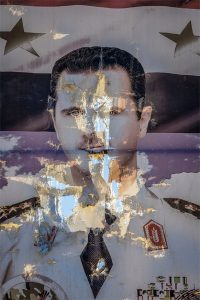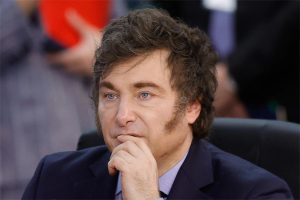
Ezra Fieser and Andreina Itriago Acosta | Bloomberg
BOGOTA/CARACAS
EnergiesNet.com 02 09 2023
In 2019, Juan Guaidó proclaimed himself the true leader of Venezuela. The fresh-faced opposition leader met world leaders at Davos, received a standing ovation at a US State of the Union Address by President Donald Trump and led giant protests in Caracas. A stalemate developed, as Guaidó was unable to oust President Nicolás Maduro and Maduro wasn’t able to douse public support for Guaidó. Four years of limbo ended with Guaidó pushed out as the head of the opposition and Maduro winning back the recognition of many foreign governments. He’s orchestrated a surprising, though fragile, economic rebound with the help of sanctions relief from the Biden administration.
1. How did the stalemate develop?
Guaidó proclaimed himself interim president by claiming that Venezuela’s constitution allowed him to take that step as head of the National Assembly, which he called the country’s last democratically elected body. Maduro, who had been narrowly elected after the death of leftist president Hugo Chavez in 2013, had won reelection in 2018 in a vote the opposition and foreign observers said was fraudulent. Foreign governments, led by the US, switched their recognition to Guaidó, backing him as the rightful leader. That left Venezuela in a bizarre situation: Maduro held the presidency in Caracas and all the power in Venezuela, but Guaidó was recognized as the interim president by dozens of foreign governments.
2. What led to Guaidó’s downfall?
Maduro never lost the support of the country’s military and police. Guaidó initially appeared to pose a serious threat to the regime, as he was able to bring large anti-government crowds to the streets repeatedly. His recognition by foreign governments gave him access to significant resources, including gold held abroad, bank accounts and assets like US refiner Citgo Corp. But after soldiers rebuffed calls to defect and protests were dispersed by police, the movement lost steam, a change accelerated by the disruptions of the Covid pandemic in 2020. The pressure on Maduro let up as the country’s economy improved from catastrophic to merely bad. By late 2022, all but a handful of countries had either stopped recognizing Guaidó or switched their recognition back to Maduro. Guaidó’s support fell at home to just 12% from 60% back in 2019. Fractures opened within the opposition movement. In December, a majority of lawmakers in the opposition-led National Assembly voted to end his interim government, effectively removing him as the key figure among the anti-Maduro forces.
3. What led to the economic improvement?
After global oil prices fell sharply in 2014, Venezuela, which counted on oil for 98% of its revenue, plunged into crisis. By 2018, inflation soared to 250,000% annually and constant shortages emerged of everything from baby formula to toilet paper, eventually leading more than 7 million residents to flee. Oil production fell by more than half after the US imposed sanctions on exports. Starting in 2020, Maduro loosened price controls and allowed the US dollar to circulate — it was already being widely used on the black market as Venezuela’s currency, the bolivar, became worthless. He adopted some more market-friendly policies, cutting down government expenses, undoing expropriations, reducing intervention in private sector activities and lifting tariffs on thousands of imported products. Maduro used support from countries like Iran to help orchestrate a rebound in oil production: Crude output more than doubled from 2020 lows, though it remains a fraction of the levels seen before the US sanctions.
4. Where did that leave the country?
Maduro’s measures helped temporarily drive monthly inflation back to single digits by 2022, though it remained the highest in the hemisphere, and reduced poverty. They also created bubbles of prosperity in some areas, especially Caracas, where a sense of normalcy returned. The proliferation of dollars and the widespread availability of basics was enough to quell most of the pressure on Maduro. Meanwhile, electoral victories by leftist leaders in Colombia and Brazil meant it could count on a friendlier regional reception, with new initiatives focusing on economic cooperation. Portugal and Spain recently appointed ambassadors to Caracas, while the US opened a direct line of communication with the regime, improving his prospects of regaining international recognition. The US also eased some sanctions on the all-important oil industry for the founding OPEC member in late November after the government signed a humanitarian deal with the opposition. That included a license for Chevron Corp. to increase some operations. Most restrictions remain in place, however, and the Biden administration has threatened to tighten them if negotiations with the opposition don’t move forward.
5. Where does this leave the opposition?
Following the dissolution of Guaidó’s interim administration, fractures widened among the numerous parties that make up the opposition. Guaidó’s own party, Popular Will, moved away from a coalition known as the G4, and Popular Will’s leader, Leopoldo Lopez, accused several other opposition leaders of being Maduro’s accomplices. Meanwhile, three other parties appointed a board of three exiled politicians to lead the National Assembly, headed by a little-known doctor living in Spain. The new leadership holds little sway over Venezuela’s pro-democracy movement, however. And the public bickering has thrown into question whether the opposition can pull off a plan to run primary elections and unite behind a single candidate to take on the government’s candidate, most likely Maduro, in the 2024 elections.
6. What is the opposition seeking?
Opposition delegates carried out two rounds of talks with the government in Mexico; in 2022, they struck what seemed to be a breakthrough agreement to join forces and work on some of the humanitarian issues facing the country, such as repairing electricity grids and the water system and upgrading schools and buying medicine and vaccines. The idea was to use some $3 billion in funds that had been frozen in foreign accounts to allow the United Nations to carry out the work. But implementing the plan has been a slower and more complex process than initially thought, with questions about how the funds — most of which are held in foreign bank accounts — would be administered. The opposition has been asking for guarantees that in the 2024 elections independent electoral monitors would be invited and previously barred candidates would be allowed to run. But Maduro and his lead negotiator, Jorge Rodriguez, have stated that they are unwilling to return to the negotiating table until the humanitarian plan is implemented. Meanwhile, the US has threatened to “snap back” the sanctions it imposed if Maduro fails to make concessions through the negotiation process.
bloomberg.com 02 08 2023












